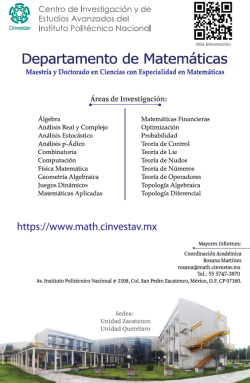José Ádem Memorial Lecture Series 2013
The topology of moduli spaces
Soren Galatius (Stanford University)
El Colegio Nacional
Luis González Obregón 23, Centro Histórico
Soren Galatius es profesor de matemáticas en Stanford University, es un líder internacional en el estudio de la topología de espacios modulares. Sus artículos han aparecido en Advances in Mathematics, Geometry and topology, Annals of Mathematics, Acta Mathematica, entre otras. Ha recibido varios premios y honores, como el Clay Research Fellowship 2007–2010, y la medalla Royal Danish Academy of Sciences “silver medal” (2010). Su investigación ha aparecido también en el Boletín de la AMS. En 2013 ha sido nombrado el octavo conferencista José Ádem Memorial Lecture Series.
Conferencia 1: Manifolds and moduli spaces
25 de septiembre de 2013. El Colegio Nacional 17:30 - 18:20 hrs.
Resumen: Manifolds arise in many areas of mathematics and science, for example as the solution set of certain equations, the state space of a physical system, or as a model for the universe. The study of manifolds and their properties has been a driving force behind topology for many decades. In this lecture I will explain the idea that the collection of all manifolds may itself be regarded as a kind of space, a moduli space, and that such spaces have interesting and useful properties.
Conferencia 2: The method of scanning
26 de septiembre de 2013. El Colegio Nacional 17:30 - 18:20 hrs.
Resumen: Scanning is a remarkably successful method for understanding the topology of moduli spaces. I will explain the method with some examples, some classical and some more recent.
Conferencia 3: Homological stability for moduli spaces
27 de septiembre de 2013. El Colegio Nacional 17:30 - 18:20 hrs.
Resumen: Moduli spaces of manifolds often arise in families, indexed by some number g. For example, there is a moduli space of genus g surfaces for each natural number g, and similar patterns appear for manifolds of higher dimension. In recent joint work with Oscar Randal-Williams, we prove that such moduli spaces often exhibit homological stability: the cohomology of the moduli space is independent of g, in a range of degrees that grows linearly with g.
Comité Organizador:
Ernesto Lupercio
Isidoro Gitler
Miguel A. Xicoténcatl
Patrocinadores
ABACUS
National Academy of Sciences, USA
Departamento de Matemáticas - Cinvestav

